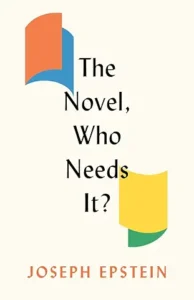The Novel, Who Needs It? by Joseph Epstein 2023
Joe Epstein, a short, Jewish kid from Chicago who loves to read and share his opinions even with those not interested in them, has always reminded me of someone I know quite well. Having spent more than 30 years teaching English at Northwestern, serving for 22 years as the editor of the American Scholar, and having written more than 35 books including essays and short stories, you’d think that he no longer needs external affirmation and attention. You’d be wrong.
His writing and editorship at the American Scholar were controversial. Criticized for his conservative views and occasional insults aimed at feminism, political correctness, and anti-racist movements, he was removed from his editorship in 1996 by a vote of the Phi Beta Kappa members, who manage the journal, and that clearly still smarts.
This book suffers from many of the faults resulting from his need for attention and affirmation. It is largely a repetitive argument for the novel’s importance which Epstein rightly ascribe to its unique ability to portray human nature in all of its complexity and unpredictability. Drawing upon the interaction between fate, destiny, and man’s free will to make choices, the novel can cast a light on its characters inner thinking, desires, and conflicts in a way that the real world never allows. Epstein praises the novel which he describes as “the supreme literary genre, that paramount purveyor of education and entertainment over the last two centuries” as the means for the reader to gain a wider, more complex view of life.
There’s no shortage of his personal biases and dislikes in this volume—political correctness, self-help and self-esteem therapeutic literature, the contemporary need to focus on sex, the internet, MFA programs, graphic novels all come in for their thrashing. And while Epstein clearly loves the Russian novelists, Proust, Kafka, Conrad, Austen, Eliot, James, and especially Willa Cather, he way overdoes the examples and praise he showers on his own work. He also has way too many quotes, which often feel like they provide him with another opportunity to show off his erudtion. One quote, however which I’ll keep forever comes from Italo Calvino who defined a classic book as one “that never finishes saying what it has to say.” Brilliant!
The book was worth reading, if for no other reason than the late chapter in which he nods to his predecessor literary critics including Trilling, Wilson, Howe, and most of all, my personal favorite, the bombastic, egotistic, and brilliant late Harold Bloom. Like Bloom, Epstein reads to expand his world, to gain wisdom from the novel’s addressing and resolving moral conflict, and for pleasure. To that end, Epstein lists 26 ‘lesser known novels and novelists who have over the years given me pleasure, broadened my outlook, and deepened my culture, all of which given world enough, and time, I can easily imagine re-reading.” It’s a grand list which along with those of Bloom, Francine Prose, Susan Hill, and Peter Orner, I’ll keep in mind (and on my phone!) as I browse used book stores down the road.
I’m left with this uncomfortable feeling that though he’s 9 years older than I am and perhaps one inch taller, the same short, Jewish, man syndrome that the other Epstein displays may be a mirror I’m staring into. PAY ATTENTION TO ME seems to be the operative principle in this book and in his recently published memoir entitled “Never Say You’ve Had A Lucky Life” and essay collection entitled “Familiarity Breeds Content” . Dwight Garner in his NYT review of these two books wasn’t very enthusiastic about them and concluded his review with these words:
“To be fair, I circled a few sentences in “Familiarity Breeds Content” happily. I’m with him on his distrust of “fun couples.” He writes, “A cowboy without a hat is suitable only for bartending.” I liked his observation, which he borrowed from someone else, that a career has five stages:
(1) Who is Joseph Epstein? (2) Get me Joseph Epstein. (3) We need someone like Joseph Epstein. (4) What we need is a young Joseph Epstein. (5) Who is Joseph Epstein?
It’s no fun to trip up a writer on what might have been a late-career victory lap. Epstein doesn’t need me to like his work. He’s published more than 30 books, and you can’t do that unless you’ve made a lot of readers happy.
Like Garner, at one level I admire Joseph Epstein while on another I feel badly for him. “The Novel, Who Needs It?” has blurbs from five distinguished writers. Sadly four of the five died many years ago and couldn’t possibly have had a look at this book they’re’ blurbing’. The remaining blurbist is even older than Epstein! In addition, the acknowledgement chapter, which in most books runs several pages and is filled with ‘thank you’s for editors, agents, family, friends, etc is in this case a single sentence. That’s an appropriate symbol for this writer who despite major accomplishments, still feels the need to justify his life and work.



